The Elegant and Energetic Flat-Coated Retriever
The Flat-Coated Retriever is a breed that embodies striking beauty and boundless enthusiasm. Often described as the “Peter Pan” of the dog world, this breed retains a playful, puppyish spirit well into adulthood. They are intelligent, sensitive, and eager to please, making them wonderful companions for the right owners. This article delves into the history, characteristics, care, and unique quirks of the Flat-Coated Retriever, offering a comprehensive guide for prospective owners and breed enthusiasts.
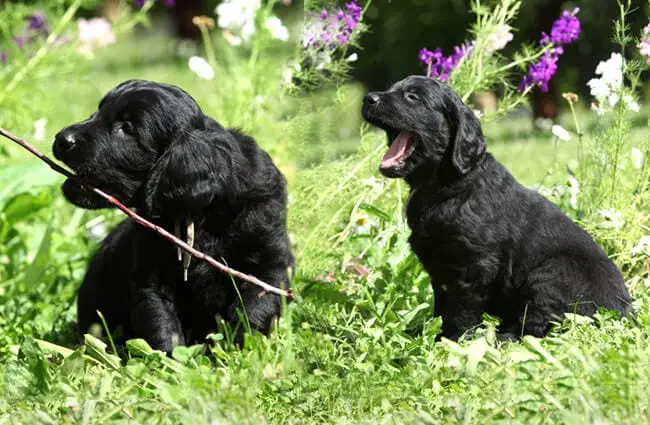
A History Rooted in Sporting Tradition
The Flat-Coated Retriever’s origins trace back to the 19th century in England. Developed as gundogs, they were prized for their speed, stamina, and retrieving ability in the field. Their lineage includes Old English Water Spaniels, Labrador Retrievers, and various setter types. Breeders intentionally selected for a sleek, flat coat—hence the breed’s name. This smooth coat provided an advantage in dense underbrush and protection from water. The breed’s popularity surged during the Victorian era, and they were frequently showcased in dog shows. After World War I and World War II, their numbers declined significantly, prompting dedicated breeders to work tirelessly to revive the breed.
Physical Characteristics and Size
Flat-Coated Retrievers are medium to large dogs with a graceful and athletic build. Males typically stand between 23 and 25 inches tall and weigh between 60 and 70 pounds. Females are slightly smaller, ranging from 22 to 24 inches in height and weighing between 50 and 60 pounds. Their coat is dense, straight, and lies close to the body, providing insulation and protection. Accepted coat colors are black, liver (a rich brown), and golden. A small white mark on the chest is permissible; excessive white markings are considered a fault. The breed has a well-proportioned head, intelligent dark eyes, a strong muzzle, and a feathered tail carried gaily, reflecting their cheerful temperament.
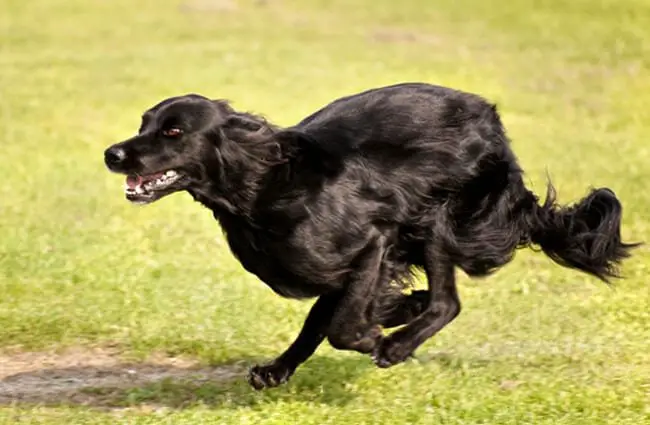
Temperament and Behavioral Traits
The Flat-Coated Retriever is renowned for its joyful and outgoing personality. They are playful, energetic, and possess an endless supply of enthusiasm. Often described as “forever young,” they retain puppyish behavior even into older age. They thrive on human companionship and form strong bonds with their families. Their intelligence and eagerness to please make them relatively easy to train, although they can display a mischievous streak. Early socialization is crucial to ensure they develop into well-adjusted adults. They generally get along well with children and other dogs, but their exuberance may overwhelm very small children or timid dogs. Because they were bred as working dogs, they require plenty of mental and physical stimulation to prevent boredom and destructive behaviors.
Caring for Your Flat-Coated Retriever
Owning a Flat-Coated Retriever is a rewarding experience, but it requires commitment and dedication. Below is a breakdown of their key care needs:
Exercise
Flat-Coats are high-energy dogs that need at least one to two hours of exercise per day. This can include brisk walks, runs, swimming, fetch, or participation in dog sports such as agility or flyball. Without sufficient exercise, they can become restless and destructive. Puzzle toys and interactive games also help keep them mentally stimulated.
Grooming
Their sleek coat is relatively easy to maintain. Regular brushing—two to three times a week—removes loose hair and keeps the coat healthy. They shed moderately year-round, with heavier shedding during seasonal changes. Occasional bathing is only necessary when they become particularly dirty. Regular ear cleaning prevents infections, and their nails should be trimmed regularly.
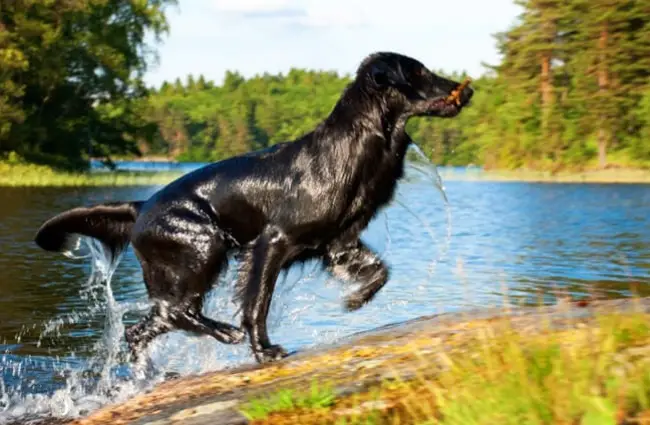
Training
Flat-Coats are intelligent and responsive, yet they can be sensitive. Positive reinforcement methods—rewards and praise—work best. Consistency and patience are key. Early socialization exposes them to a variety of people, places, and situations. They excel in obedience training, agility, and other dog sports. Addressing behavioral issues early, with help from a professional trainer if necessary, ensures a harmonious relationship.
Diet
A high-quality dog food formulated for medium to large breeds is essential. The amount of food varies with age, activity level, and metabolism. Avoid overfeeding, as this can lead to weight gain. Always provide access to fresh, clean water.
Health Considerations
While generally a healthy breed, Flat-Coated Retrievers are prone to certain conditions. Common concerns include:
- Hip and Elbow Dysplasia: A genetic condition that affects joint formation.
- Progressive Retinal Atrophy (PRA): A degenerative eye disease that can lead to blindness.
- Cancer: A higher incidence of certain cancers, such as lymphoma and osteosarcoma.
- Bloat (Gastric Dilatation-Volvulus): A life-threatening condition requiring immediate veterinary attention.
Responsible breeders screen their dogs for these conditions to minimize the risk of passing them on. Regular veterinary checkups are essential to detect health problems early.
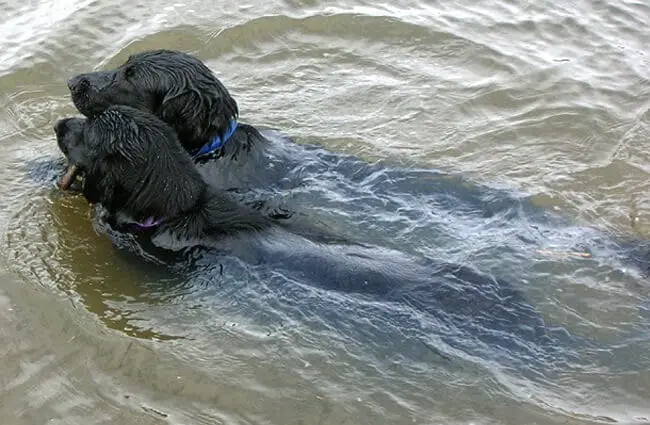
Is a Flat-Coated Retriever Right for You?
The Flat-Coated Retriever is an excellent companion for active families who can provide ample exercise, mental stimulation, and affection. They thrive in homes where they are considered part of the family and have opportunities to interact with people and other dogs. However, they are not suitable for everyone. They demand significant time for training, exercise, and grooming. If you prefer a laid-back, low-maintenance dog, this breed may not be the best fit. But if you are prepared to meet their needs, you will be rewarded with a loyal, playful, and loving companion who will bring joy to your life for many years.
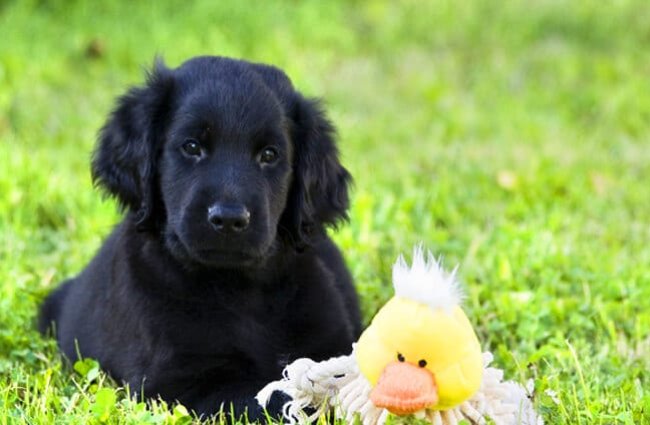
The Flat-Coated Retriever remains a beloved breed, cherished for its stunning looks, spirited personality, and unwavering devotion. They are a true testament to the enduring bond between humans and dogs.

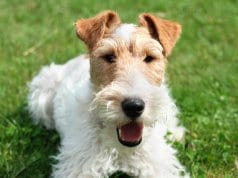
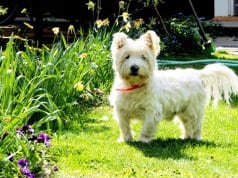
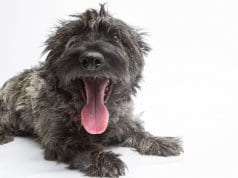
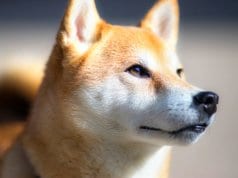
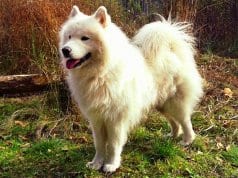
![Red Angus Closeup of a beautiful Red Angus cowPhoto by: U.S. Department of Agriculture [pubic domain]https://creativecommons.org/licenses/by/2.0/](https://animals.net/wp-content/uploads/2020/03/Red-Angus-4-100x75.jpg)

